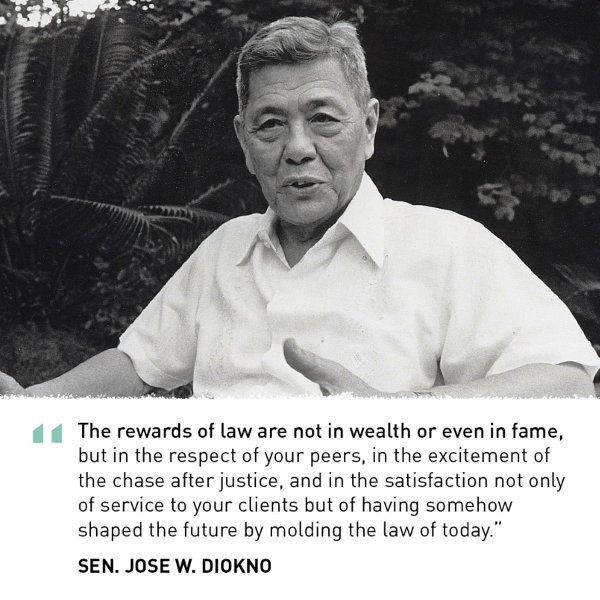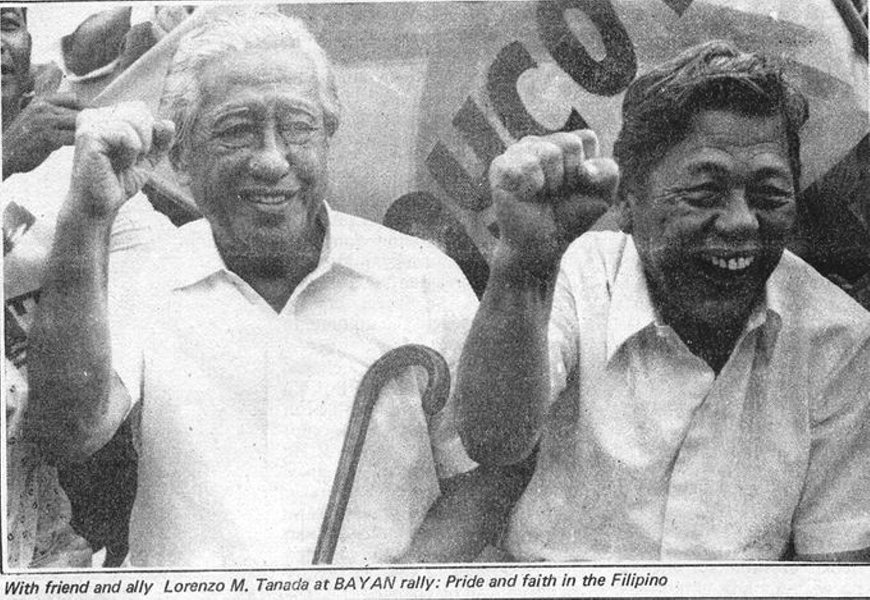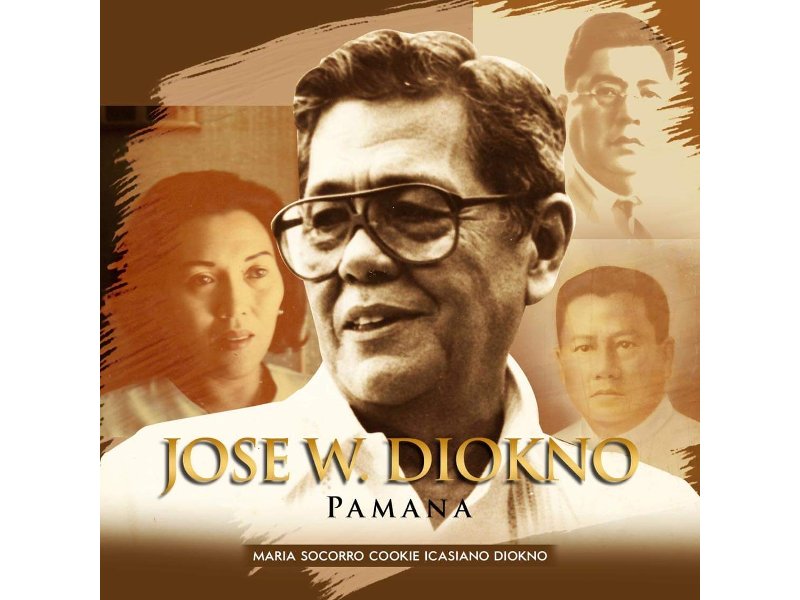
Quotable Diokno. Meme from the Facebook page of Jose W. Diokno, public figure.
Former senator and human rights champion Jose W. Diokno, the man who “grieved for the death of the law” during the years of the Marcos dictatorship, must be grinning, wherever he is. On the occasion of Ka Pepe’s birth centenary on Feb. 26 and his 35th death anniversary on Feb. 27, the De La Salle University (DLSU), in a virtual program, renamed its College of Law into the Tañada-Diokno College of Law and the DLSU Publishing House launched his daughter Maria Socorro’s book Pamana.
To kick off these occasions, Bishop Virgilio “Ambo” David, recipient of the 2019 Diokno Human Rights Award, recalled that year when he couldn’t personally receive the prize. He asked his brother, the sociologist and columnist Randy, to receive it in his stead because the bishop was under a death threat as a result of his opposition to the extra-judicial killings in President Duterte’s drug war and his defense of the victims and survivors.
In his homily, he compared Diokno’s transformation to the three stages in German philosopher Nietzsche’s metamorphosis of the human spirit. These stages include the camel stage, the lion and finally, little children. During the early camel or maybe carabao stage, David said, the person carries the burden of tradition, following what the parents, teachers, even priests say, no questions asked.
In the angry lion stage, the person becomes uncomfortable with traditions, even false narratives and myths. David said if the children are sent to a Catholic school, the way Diokno was sent to DLSU for his education, parents are fearful of the time when their kids start quoting Marx or other progressive thinkers. Diokno was qualified to enter the University of the Philippines and wanted to, but his parents prevailed on him to continue his La Salle education.
The last stage is becoming like little children who speak the candid truth. David commended Diokno for not being cowed by imprisonment under the Marcos regime and for continuing to be bold in saying the truth. And yet, the bishop didn’t see anger in the former prisoner’s eyes which “had a way of infecting us with his boldness.” Diokno’s “childlike faith made him survive imprisonment,” David said.
He compared Diokno to the little child in the fairy tale “The Emperor’s New Clothes” who had the gall to shout out loud, “The King is naked!” Diokno pointed out the “naked tyrant” followed by his amused, hearty laughter and fits of coughing.
David also said Diokno was “entering the child stage in his spiritual metamorphosis.” He said tyrants have no other purpose for locking up their enemies other than to break their spirit. Diokno and former Sen. Benigno Aquino Jr., he said, must have exasperated Marcos because they did not remain silent after their respective release. After two years of imprisonment without charges, Diokno taught at UP and took on the pro bono defense of activists and political detainees.
David recalled how he brought the witnesses of the Kian de los Santos killing, whom he was protecting, to the Commission on Human Rights. While there, the bishop looked out the window overlooking the statue of Diokno installed at the plaza below. He said, “It had a calming effect on me in the face of tyranny.” He realized then that one must never give the tyrant the pleasure of losing one’s right to laugh out loud, a lesson Diokno taught him.
Brother Bernard Oca, president of DLSU, said the College of Law at his university was put up in 2009 with Atty. Jose Manuel “Chel” Diokno as founding dean. The renaming of the college after former Sen. Lorenzo Tanada and Diokno was in recognition of these two exemplary lawyers who took the same road frequently during the martial law years, taking up the cause of the indigenous peoples opposed to the Chico River Dam project, opposing the US bases and nuclear power plant, among other things.
Oca called them libertarians and nationalists and although they were 24 years apart, they joined forces to remind lawyers to “make a better world for all of us.” He praised their lives for exemplifying “the values of true La Sallians.”
Former Sen. Wigberto “Bobby” Tañada, Lorenzo’s son, thanked DLSU for honoring Diokno and his father whom he called “comrades-in-arms against martial law,” who demonstrated courage against fire by braving tear gas, truncheons and bullets in the Parliament of the Streets.

Lorenzo Tañada and Jose W. Diokno at a rally. From the Twitter account of Tonyo Cruz
He said the elder Tañada was “a profile in courage” who inspired a generation with his openness as a lawyer to both rich and poor “if the cause is right and just” and with his standing up “against the evils of dictatorship.”
Atty. Chel Diokno, senatorial aspirant under the Robredo-Pangilinan ticket, described his father as “an incurable optimist” who believed in “the greatness of the Filipino soul,” “an avid student of history who truly loved the Philippines.”
The elder Diokno reiterated that “Filipinos should never stop loving our country and should make that love the centerpiece of our being.”
During the launching of her book on her father, mother and forebears, author Maria Socorro spoke, among other things, about the foibles of Diokno, including his difficulty in speaking straight Filipino.
She cited how he pronounced Filipino words that ended in “iw” (giliw, paksiw, sisiw) as “iu” instead of “iw”: giliw became giliu, paksiw became paksiu, and sisiw became sisiu.

Following is Diokno’s favorite prayer which she shared. The source is anonymous.
Credo
Where Justice Will Flourish
I believe in God the Parent of us all, who has given the earth to all people.
I believe in Jesus Christ, who came to encourage us and to heal us, to deliver us from oppressors, to proclaim the peace of God to all. He has given Himself to the world. The Lord lives among all people. He is among us as the Living God.
I believe in God’s spirit, who works in every man and woman of good will.
I believe in the Church, called to be a light for all nations, urged by the Spirit to serve all people.
I believe that God will finally destroy the power of sin in all of us, and that all will share God’s everlasting life.
I do NOT believe in the right of the strongest, nor the force of arms, nor the power of the oppressors.
I want to believe in human rights, in the solidarity of all people and the power of nonviolence.
I do NOT believe in racism, in wealth, privilege, or the established order.
I want to believe that all women and men are equal; and that order based on violence and injustice is NOT order.
I do NOT believe that I can fight oppression if I tolerate injustice.
I want to believe that there is but one right everywhere; that I am not free if even one person remains enslaved.
I do NOT believe that war and hunger are inevitable, and peace unattainable.
I want to believe in the beauty of simplicity, in love with open hands, in genuine peace on earth—in our time.
I do NOT believe that all suffering is in vain, nor that our dreams will remain but dreams, nor that death is the end.
I dare to believe, always and in spite of everything, in a new humanity; in God’s own dream of a new heaven which is a new earth where genuine peace will flourish because there is JUSTICE.
For inquiries on the purchase of Pamana, email dlsupublishinghouse@dlsu.edu.ph.
